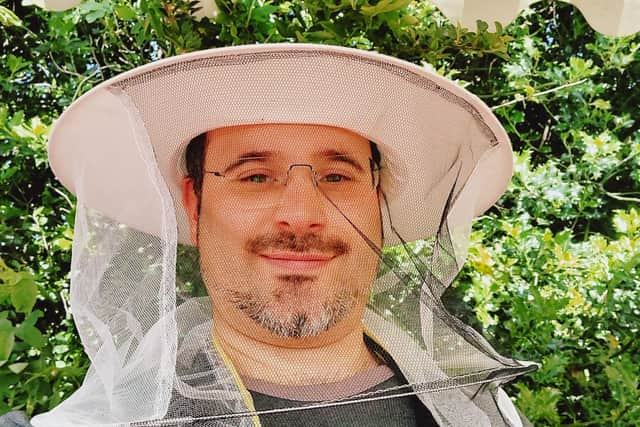Meet Scotland’s honey sommelier – the beekeeper in charge of two million insects
“Honey is a taste of the landscape, a sensory journey into a moment in time,” according to Dr Gino Jabbar, a beekeeper, honey connoisseur and physicist.
It’s sweet, golden and good for you, a genuine superfood, with anti-inflammatory, antioxidant and antibacterial properties.
On top of that, its makers, the bees, are crucial to much of life on earth, performing crucial pollination services for plants – including a large share of
And nobody is more passionate about honey and bees than Dr Jabbar.
He keeps around two million of the insects – about 50 colonies – in a variety of locations around Edinburgh and the Lothians, producing an award-winning range of honeys under his brand Simply Honey.
He’s also a fully qualified honey-tasting expert and adviser – a “honey sommelier”, if you like, similar to a wine or whisky aficionado but able to detect the unique nuances in any particular honey.
On top of all this, he also trains future beekeepers and runs a selection of workshops and special experiences.

“On a practical level, the bee is a major pollinator, meaning it catalyses the development of fruit and seeds that produces a greener planet by increasing plant density in the surrounding area,” he said.
“On a cultural level, the bee is an endless source of inspiration and wonder.
“People have always lived with bees and sought after their products – like wax and propolis – for material or medicinal purposes.
“The social cohesion of bees and their ability to work for the common good of the hive, producing a sweet substance, leaves much to ponder philosophically.”

Humans have been keeping bees for millennia, with evidence showing domestication in ancient Egypt at least 4,500 years ago.
It’s not just a job for Dr Jabbar. It’s a vocation – inspired by the taste of a honey his grandparents brought back from a holiday.
“I couldn’t believe the flavour,” he said. “Nothing else like it.”

It was a thyme honey from the south of Italy, where his grandmother hails from.
“It's a very aromatic honey.”
It ignited a spark inside him, and that fire has continued to burn.
“I have always had a love for honey, and thought it would be nice to one day own a beehive and produce some honey.
“That day came unexpectedly after finishing my PhD in physics and I was looking for an excuse to spend more time outdoors after what felt like years stuck inside in labs.
“Very quickly I caught ‘bee fever’ and became obsessed by the insects and their clever little society.
“After many years of learning about bees and beekeeping from my mentor, I started to produce my own honey and my focus turned to what it really is and why it tastes so good.”
These questions led him to show his honey locally and eventually to undertake specialist courses in Italy, dedicated to honey as a food and its aromatic qualities.
After much study, he successfully passed a rigorous ‘blind taste’ exam and was admitted to the Italian National Register of Experts in the Sensory Analysis of Honey – a world-renowned authority on the amber nectar.
He is the only person in the UK to have achieved the prestigious accolade. But what does it mean?
“A honey sommelier, or honey sensory analyst, is someone trained to recognise honey varieties by their characteristics of colour, aroma, taste, flavour and texture,” he explained.
“In addition, it is someone who can describe the aromas present in honey to support honey producers in communicating the flavour of their honey and to authenticate specific floral sources.
“It’s very similar to the work of experts in wine.
“The role is an important one as it treats honey as an aromatically rich food rather than just the product of the hive and elevates its status to the special food it truly is.”
He believes the public should be aware of the importance of bees and honey, but acknowledges that not everyone can have their own hive.
“Keeping bees comes with a huge responsibility and a steep learning curve, and so it is unrealistic for everyone to become a beekeeper,” he said.
“What is important is that there is an awareness of what beekeepers do, and the basic knowledge of different honey varieties.
“Most people are aware that cheddar and parmesan are different types of cheeses.
“I am on a mission to build a honey culture where people can talk about honey varieties such as lime and hawthorn with similar clarity.
“During my honey-tasting experiences I seek to impart this knowledge to participants and leave them excited about the world of honey.”
He has been involved in founding the new Honey Guild of the UK, to evaluate and teach honey sensory analysis here.
So, is there one honey that he thinks is the best on the planet?
“The beauty of honey is that there are so many varieties to experience and so there is a honey to suit all palates,” he said.
“We produce fantastic honey here in Scotland.
“For example my Edinburgh summer honey is very fruity and has an underlying citrus base, whereas my Edinburgh spring honey is more woody and smokey, like an aged whisky.”
He includes colourful tasting notes with his Simply Honey range as well as some suggestions for food pairings.
But he recommends trying any honey ‘neat’ in the first instance.
“I would advise eating honey by itself to gain the full experience,” he said.
“Honey is a taste of the landscape, a sensory journey into a moment in time.”